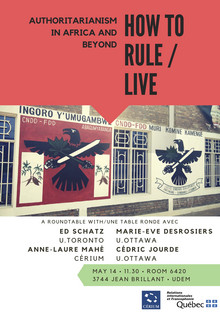Authoritarianism in Africa and Beyond : How to rule/live

Half the world’s population currently lives in nondemocratic regimes that range from strong authoritarianism to moderate regimes presenting democratic features. As scholars have recently claimed, this number may even be growing given democratic backsliding in Turkey, Hungary and even the United States. The trend is also noticeable in Africa: the past years have seen a number of rulers attempting to circumvent presidential term limits and clamp down on opposition forces in autocratic moves that have contributed to some of the continent’s more dramatic political crises in the past few years, such as in Burundi. How do authoritarian regimes sustain their rule? What are the tools these regimes use and how does society react to these authoritarian strategies? What does living in an authoritarian regime mean? Scholarship on authoritarianism often focuses on the coercion employed by authoritarian rulers and, on the other hand, on the obedience of the governed. This roundtable pushes beyond these conventional perspectives by examining the multiple practices of authoritarianism, as well as the diversity and variability of people’s experiences in authoritarian contexts. Showcasing cases from Africa to Central Asia, this event brings together Ed Schatz (University of Toronto), Marie-Eve Desrosiers (University of Ottawa), Cédric Jourde (University of Ottawa), and Anne-Laure Mahé (CÉRIUM).
Presentations in english followed by a bilingual discussion / Presentations en anglais suivies d’une discussion bilingue.
Ed Schatz is an Associate Professor of Political Science at the University of Toronto. He is interested primarily in identity politics, social transformations, social movements, anti-Americanism, and authoritarianism with a focus on the ex-USSR, particularly Central Asia. His publications include an edited volume, Political Ethnography (U. Chicago Press, 2009), and Modern Clan Politics (U. Washington Press, 2004), as well as articles in Comparative Politics, Slavic Review, International Political Science Review, Ethnic and Racial Studies, Nationalism and Ethnic Politics, and other academic journals. His current projects include a book on the United States as a symbol and actor in Central Asia and a study of authoritarianism in Central Asia. The American Political Science Association selected Professor Ed Schatz as the co-recipient of the Giovanni Sartori Book Award for his work, Political Ethnography: What Immersion Contributes to the Study of Power.
Marie-Eve Desrosiers is Associate Professor in the School of International Development and Global Studies at the University of Ottawa. She studies political crises and civil conflicts, the role of identity in contentious politics, state-society relations, and authoritarianism. Her most recent research has examined the resilience strategy of pre-genocide Rwandan regimes and the authoritarian experience in Rwanda during the late twentieth century, as well as the framing of identity-based conflicts. She also regularly publishes on Canadian international policy.
Cédric Jourde is Associate Professor at the School of Political Studies at the University of Ottawa. He is also one of the editors of the Canadian Journal of African Studies. He studies the various trajectories of political Islam and ethnicity in the Sahel, democratization processes and authoritarian regimes in western Africa and the cultural aspect of their politics. In his most recent research, he focuses on the interplay between Islam, ethnic solidarities and the caste system in Senegal and Mauritania.
Anne-Laure Mahé is a research fellow at the CÉRIUM. She holds a PhD in political science from Université de Montréal (2017). She studies nondemocratic regimes, focusing especially on the relationship between development policies and authoritarian resilience in Africa and especially in Sudan. Her research has been published in the Canadian Journal of Political Science and Égypte/Monde Arabe.
Crédit affiche: Photographie par Katrin Wittig
Emplacement : Université de Montréal, 3744 rue Jean-Brillant, salle 6420 (6ème étage)